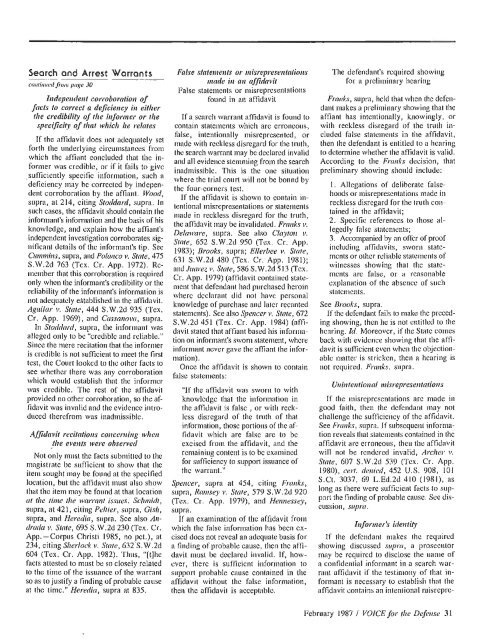Robert Richard Thornton - Voice For The Defense Online
Robert Richard Thornton - Voice For The Defense Online
Robert Richard Thornton - Voice For The Defense Online
Create successful ePaper yourself
Turn your PDF publications into a flip-book with our unique Google optimized e-Paper software.
Search and Arrest WarrantsIndependent corroboration offacts to correct a deficiency in eitherthe credibility of the infomer or thespecificity of that which he relatesIf the affidavit does not adequately setforth the underlying circumstances fromwhich the affiant concluded that the informerwas credible, or if it fails to givesufficiently specific information, such adeficiency may be corrected by independentcorroboration by the affiant. Wood,supra, at 214, citing Stoddard, supra. Insuch cases, the affidavit should contain theinformant's information and the basis of hisknowledge, and explain how the affiant'sindependent investigation corroboiates significantdetails of the informant's tip. SeeCu~nmins, supra, and Polanco v. Store, 475S.W.2d 763 (Tex. Cr. App. 1972). Rememberthat this corroboration is requiredonly when the informant's credibility or thereliability of the informant's information isnot adequately established in the affidavit.Aguilar v. State, 444 S.W.2d 935 (Tex.Cr. App. 1969), and Cassanova. supra.In Stoddard, snpra, the informant wasalleged only to he "credible and reliable."Since the mere recitation that the informeris credible is not sufficient to meet the firsttest, the Court looked to the other facts tosee whether there was any corroborationwhich would establish that the informerwas credible. <strong>The</strong> rest of the affidavitprovided no other corroboration, so the affidavitwas invalid and the evidence introducedtherefrom was inadmissible.Affiavit recitations concerning ~vhenthe events were observedNot only must the facts submitted to themagistrate he sufficient to show that theitem sought may be found at the specifiedlocation, but the affidavit must also showthat the item may be found at that locationat the time the warrant issues. Schmidt,supra, at 421, citing Peltier, supra, Gish,snpra, and Heredia, supra. See also Andradav. State, 695 S.W.2d 230 (Tex. Cr.App.-Corpus Christi 1985, no pet.), at234, citing Sherlock v. State, 632 S.W.2d604 (Tex. Cr. App. 1982). Thus, "[tlhefacts attested to must be so closely relatedto the time of the issuance of the warrantso as to justify a finding ofprobable causeat the time." Heredia, supra at 835.False statements or misrepresentationsmade in an affidavitFalse statements or misrepresentationsfound in an affidavitIf a search warrant affidavit is found tocontain statements which are erroneous,false, intentionally misrepresented, ormade with reckless disregard for the tmth,the search warrant may be declared invalidand all evidence stemming from the searchinadmissible. This is the one situationwhere the trial court will not be bound bythe four-corners test.If the affidavit is shown to contain intentionalmisrepresentations or statementsmade in reckless disregard for the truth,the affidavit may be invalidated. Franks v.Delaware, supra. See also Clayton v.State, 652 S.W.2d 950 (Tex. Cr. App.1983); Brooks, snpra; Ellerbee v. State,631 S.W.2d 480 (Tex. Cr. App. 1981);and Jnarez v. State, 586 S.W.2d 513 (Tex.Cr. App. 1979) (affidavit contained statementthat defendant had purchased heroinwhere declarant did not have personalknowledge of purchase and later recantedstatements). See also Spencer v. State, 672S.W.2d 451 (Tex. Cr. App. 1984) (affidavitstated that affiant based his informationon informant's sworn statement, whereinformant never gave the affiant the information).Once the affidavit is shown to containfalse statements:"If the affidavit was sworn to withknowledge that the information inthe affidavit is false , or with recklessdisregard of the truth of thatinformation, thoseportions of the affidavitwhich are false are to beexcised from the affidavit, and theremaining content is to be examinedfor sufficiency to support issuance ofthe warrant."Spencer, supra at 454, citing Fronks,snpra, Ranrsey v. State, 579 S.W.2d 920(Tex. Cr. App. 1979), and Hennessey,supra.If an examination of the affidavit fromwhich the false information has been exciseddoes not reveal an adequate basis fora finding of probable cause, then the affidavitmust be declared invalid. If, however,there is sufficient information tosupport probable cause contained in theaffidavit without the false information,then the affidavit is acceptable.<strong>The</strong> defendant's required showingfor a preliminary hearingFranks, supra, held that when the defendantmakes a preliminary showing that theaffiant has intentionally, knowingly, orwith reckless disregard of the truth includedfalse statements in the affidavit,then the defendant is entitled to a hearingto determine whether the affidavit is valid.According to the Franks decision, thatpreliminary showing should include:1. Allegations of deliberate falsehoodsor misrepresentations made inreckless disregard for the truth containedin the affidavit;2. Specific references to those allegedlyfalse statements;3. Accompanied by an offer of proofincluding affidavits, sworn statementsor other reliable statements ofwitnesses showing that the statementsare false, or a reasonableexplanation of the absence of suchstatements.See Brooks, snpra.If the defendant fails to make the precedingshowing, then he is not entitled to thehearing. Id. Moreover, if the State comesback with evidence showing that the affidavitis sufficient even when the objectionablematter is stricken, then a hearing isnot required. Franks, supra.If the misrepresentations are made ingood faith, then the defendant may notchallenge the sufficiency of the affidavit.See Franks, supra. If subsequent informationreveals that statements contained in theaffidavit are erroneous, then the affidavitwill not be rendered invalid, Archer v.State, 607 S.W.2d 539 (Tex. Cr. App.1980), cert. denfed, 452 US. 908, 101S.Ct. 3037, 69 L.Ed.2d 410 (19811, aslong as there were sufficient facts to supportthe finding of probable cause. See discussion,supra.Znfor~ner's identityIf the defendant makes the requiredshowing discussed sripra, a prosecutormay be required to disclose the name ofa confidential informant in a search warrantaffidavit if the testimony of that informantis necessary to establish that theaffidavit contains an intentional misrepre-February 1987 1 VOICE for the <strong>Defense</strong> 31

















